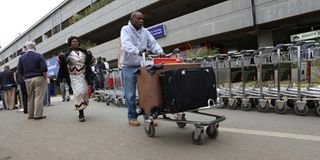Screening for Ebola widened at Jomo Kenyatta International Airport

Passengers arrive at the Jomo Kenyatta International Airport in Nairobi on August 18, 2014. PHOTO | BILLY MUTAI |
What you need to know:
- The expanded screening measures came as Health Cabinet Secretary James Macharia allayed fears of the deadly viral disease entering Kenya.
- So far, only four cases have been reported of suspected Ebola, all in Nairobi, but have since been cleared on being given a clean bill of health.
All airlines flying to Ebola-stricken West Africa and transiting through Kenya will have their passengers screened, the government announced on Monday.
The decision affects Ethiopian Airlines and Rwanda Air, two carriers that fly to the region.
Kenya Airways has stopped flying to the worst-hit countries of Guinea, Sierra Leone and Liberia following a government order but its competition is yet to announce such measures.
The expanded screening measures came as Health Cabinet Secretary James Macharia allayed fears of the deadly viral disease entering Kenya, saying four people who had initially being suspected of carrying it had tested negative.
He also told MPs that the budget to fight the disease, which had killed more that 1,000 people in four West African countries, had been increased from Sh533 million to Sh670 million.
INCLUDE OTHER COUNTRIES
The screening, which started on Monday, affects all visitors from West Africa, including Ghana which is yet to report any Ebola case.
Initially, the screening of passengers was limited to visitors from Liberia, Guinea Conakry and Sierra Leone but it will now include other countries, among them neighbouring Ethiopia which hosts transit passengers from West Africa.
“We have realised that the cancellation of flights from Sierra Leone, Guinea and Liberia has made other people fly to other neighbouring countries and then take connection flights to Kenya which has made us now start screening all visitors from North and West Africa,” said Dr Mohammed Duda, the director in charge of public health at the JKIA clinic.
The screening was a precautionary measure aimed at ensuring that no Ebola case gets into the country.
“We are taking temperature levels before departure and on arrival to check if there are any signs of fever because it’s the most standard way of checking for Ebola symptoms,” said Dr Duda.
So far, only four cases have been reported of suspected Ebola, all in Nairobi, but have since been cleared on being given a clean bill of health.
KENYA AIRWAYS TO COMPLY
On Saturday, Mr Macharia said that no passengers travelling from and through Sierra Leone, Guinea and Liberia would be allowed into Kenya effective Tuesday midnight.
Kenya Airways boss Titus Naikuni said the airline would comply with the directive.
At Afya House, Mr Macharia said samples of the suspected Ebola cases which were tested at the Kenya Medical Research Institute (Kemri) had all tested negative.
“The last sample was tested on Friday and the results turned negative for Ebola.. I would, therefore, like to confirm that there is no case of Ebola in this country,” he said.
The suspected cases involved travellers who had flown in aboard flights from the West African countries at the centre of the deadliest outbreak.
KNH Communications Manager Simon Ithai said the latest case involved a woman who had arrived from Liberia and was heading to Qatar on Friday. She had turned negative for the disease.
RELEASE FUNDS
At Parliament Buildings, Mr Macharia requested Treasury to release Sh670 million to fight Ebola.
He said they had asked Treasury CS Henry Rotich to release the funds for use in putting in place contingency measures, but had been advised to use the Sh50 million the ministry sets aside for emergencies, then ask for the shortfall.
Mr Macharia said the money would be used to extend cover to all entry points in the country, engage in massive public awareness campaigns about the disease and expand isolation facilities.
In addition, the ministry will install digital thermostats, at airports and other ports that would automatically take temperatures of travellers.
Reports by Griffins Omwenga, Mike Mwaniki and John Njagi



